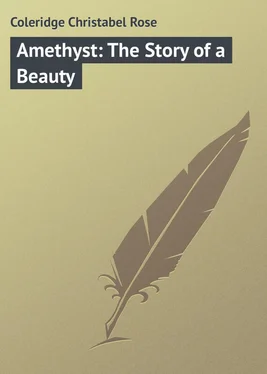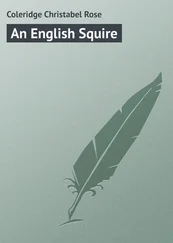Christabel Coleridge - Amethyst - The Story of a Beauty
Здесь есть возможность читать онлайн «Christabel Coleridge - Amethyst - The Story of a Beauty» — ознакомительный отрывок электронной книги совершенно бесплатно, а после прочтения отрывка купить полную версию. В некоторых случаях можно слушать аудио, скачать через торрент в формате fb2 и присутствует краткое содержание. Жанр: foreign_prose, на английском языке. Описание произведения, (предисловие) а так же отзывы посетителей доступны на портале библиотеки ЛибКат.
- Название:Amethyst: The Story of a Beauty
- Автор:
- Жанр:
- Год:неизвестен
- ISBN:нет данных
- Рейтинг книги:5 / 5. Голосов: 1
-
Избранное:Добавить в избранное
- Отзывы:
-
Ваша оценка:
- 100
- 1
- 2
- 3
- 4
- 5
Amethyst: The Story of a Beauty: краткое содержание, описание и аннотация
Предлагаем к чтению аннотацию, описание, краткое содержание или предисловие (зависит от того, что написал сам автор книги «Amethyst: The Story of a Beauty»). Если вы не нашли необходимую информацию о книге — напишите в комментариях, мы постараемся отыскать её.
Amethyst: The Story of a Beauty — читать онлайн ознакомительный отрывок
Ниже представлен текст книги, разбитый по страницам. Система сохранения места последней прочитанной страницы, позволяет с удобством читать онлайн бесплатно книгу «Amethyst: The Story of a Beauty», без необходимости каждый раз заново искать на чём Вы остановились. Поставьте закладку, и сможете в любой момент перейти на страницу, на которой закончили чтение.
Интервал:
Закладка:
“I hope she will find Cleverley pleasant,” said Miss Riddell as she rose to take leave.
“I’m sure she will,” said Lady Haredale sweetly and cordially, as she shook hands with her guest. “Of course we shall do our best to enjoy ourselves while we are in retreat. Though I don’t mind confessing to you that I detest the country.”
“She looks innocent enough,” thought Miss Riddell as she walked away. “Silly I should say – but a real beauty.”
“That woman’s more frumpish than Aunt Annabel,” said one of the girls as the door closed behind the visitor.
“Just her style, dear good creature,” said Lady Haredale. “But they’re the Cheshire Riddells, you know, my dear – quite people to be civil to.”
Chapter Four
The Home Circle
Lady Haredale was naturally gifted with peculiarly even, cheerful spirits. She had a great capacity for enjoyment, though she had troubles enough to break down a better woman. She had married at seventeen a man much older than herself, already in embarrassed circumstances. Her step-children both disliked her, and had given her very good cause to dislike them.
She had four nearly portionless girls of her own to marry, and she herself had endless personal anxieties and worries, springing alike from want of money and from want of principle. Truly she had often not the wherewithal to pay for her own and her daughters’ dress. She did not mind being in debt because it was wrong, but she found it very disagreeable. She belonged to a circle of ladies who played cards, and for very high stakes. That led to complications. She was a beauty and had many admirers, with whom she liked to maintain sentimental relations, and she was just really sentimental enough not always to stop at the safe point. Very uncomfortable trains of circumstances had arisen from the indulgence of this taste; and, if she had had no regrets or difficulties of her own, Lord Haredale’s character and pursuits would have given her plenty. Nor had she outer interests or resources in herself. She never realised, she seemed scarcely to have heard of all the various forms of philanthropy which are furthered by so many ladies of position. She did not care for politics, literature, or art. She was probably conscious of being much more charming than most of the women who occupied themselves with these interests; but on the whole it was rather that she did not know anything about them, than that she set herself against them. As for religion, she was really hardly conscious of its claims upon her beyond an occasional attendance at church, and due consideration for the social rank of a bishop. In such unconsciousness rather than opposition Lady Haredale was behind and unlike her age; but the state of mind may still be found, where dense perceptions and exclusive habits co-exist.
Yet she was always ready for a fresh amusement; she enjoyed gossip of a piquant and scandalous nature; she greatly enjoyed admiration, and treading on social white ice. When none of these excitements were at hand, she liked realistic novels, and comfortable chairs, and good things to eat and drink. She also liked her little girls, though she took very little trouble about them; and, though it cannot be denied that Satan did find some mischief for her idle heart and brain, if not for her idle hands to do, he did not often manage to lower her spirits or ruffle her temper. She not only did what she liked – what is less common, she liked what she did.
But her young daughters did not inherit this cheery serenity. They had no intelligent teaching, no growing enthusiasms to occupy their minds, and they were inconceivably ignorant and bornées . They were entirely unprincipled, using the word in a negative sense, and they had not their mother’s steady health. They had knocked about, abroad and at home, with careless servants, and foreign teachers. They had been to children’s balls, and had been produced in picturesque costumes at grown-up entertainments; till, lacking their mother’s spirit, they were apt to look on cynically, while she devised fresh schemes of amusement.
“Lady Haredale is so fresh!” Una had once remarked, to the intense amusement of her partner, at one of those “children’s parties,” which are given that grown-up people may admire the children, and amuse themselves.
These three children, in the afternoon in Easter week on which Amethyst was expected, had grouped themselves into the bow-window of the drawing-room, looking with their long hair, black legs, and fashionable frocks, like a contemporary picture in Punch.
“Dismal place this!” said Una, yawning and looking out at the garden.
“Oh,” said Kattern, as the next girl, Katherine, was usually called, “my lady will have all the old set here soon.”
They often called their mother “my lady,” after the manner of their half-brother and sister.
“Yes,” said Victoria, the youngest, in a slow, high-toned drawl. “It’s quite six weeks since we’ve seen Tony. He’ll be coming soon, and Frank Chichester, I dare say. Frank’ll give you a chance, Una.”
“Frank Chichester! I don’t value boys; they have no conversation. You and Kattern may pull caps for him.”
“Tory’s too rude,” said Kattern. “He never forgave her for saying, when he asked her to dance, that she must watch him to see how he moved.”
“I thought that was chic ,” said Tory; “some men like it, and coax you.”
“He’s too young for it,” said the experienced Una; “not my style at all.”
“Ah, we know your style – dear Tony.”
“Be quiet,” interposed Una, angrily, and with scarlet cheeks; “what’s my style to such little chits as you?”
“Little chits indeed!” said Tory. “ You might be glad to be a little chit. You’re getting to the awkward age, and you won’t have a little girl’s privileges much longer. You’d better look out. And besides, we shall none of us wear as well as my lady.”
“There’ll be Amethyst,” said Kattern. “If she’s so awfully pretty, we shall be out of the running.”
“She’s sure to be bread-and-butterish and goody; that won’t pay,” said Tory. “Now be quiet, I want to finish my book before she comes.”
“What’s it about?” asked Kattern.
“She married the wrong man, and the hero wants her to run away with him, but I suppose the husband will die, so it will all come right!” said Tory, drawing up her black legs into a comfortable attitude, and burying herself in her book.
On that morning Amethyst had been taken to London by her aunt; and, by no means so miserable as she thought she ought to have been, was delivered over to her father’s care.
Matters had settled themselves fairly pleasantly for Miss Haredale. Her house was let, and an old friend had asked her to go abroad with her for the summer, so that she was not left to solitude – a greater consolation just now to Amethyst than to herself. The girl felt the parting; but eager interest in the new old house, longing for her mother and sisters, and shy pleasure in her father’s notice, overwhelmed the feeling and pushed it aside for the time. She was delighted when her father took her to lunch at Verey’s, and enjoyed the strawberry ice which he gave her. She tried to adapt her conversation to what she supposed might be Lord Haredale’s tastes, and asked him if the hunting near Cleverley was good.
“Fond of riding, eh?” he said. “I haven’t been out for years, – never was much in my line. But your aunt, she was the best horse-woman in the county. Fellows used to lay bets on what ugly places Annabel Haredale would go in for next. But she was up to the game, and when she was expected to show off would ride as if she were following a funeral – make them open all the gates for her, and then go ahead like a bird and distance everybody. – You’ll do, if you have her hand at a horse’s mouth, and her seat on the saddle.”
Читать дальшеИнтервал:
Закладка:
Похожие книги на «Amethyst: The Story of a Beauty»
Представляем Вашему вниманию похожие книги на «Amethyst: The Story of a Beauty» списком для выбора. Мы отобрали схожую по названию и смыслу литературу в надежде предоставить читателям больше вариантов отыскать новые, интересные, ещё непрочитанные произведения.
Обсуждение, отзывы о книге «Amethyst: The Story of a Beauty» и просто собственные мнения читателей. Оставьте ваши комментарии, напишите, что Вы думаете о произведении, его смысле или главных героях. Укажите что конкретно понравилось, а что нет, и почему Вы так считаете.












